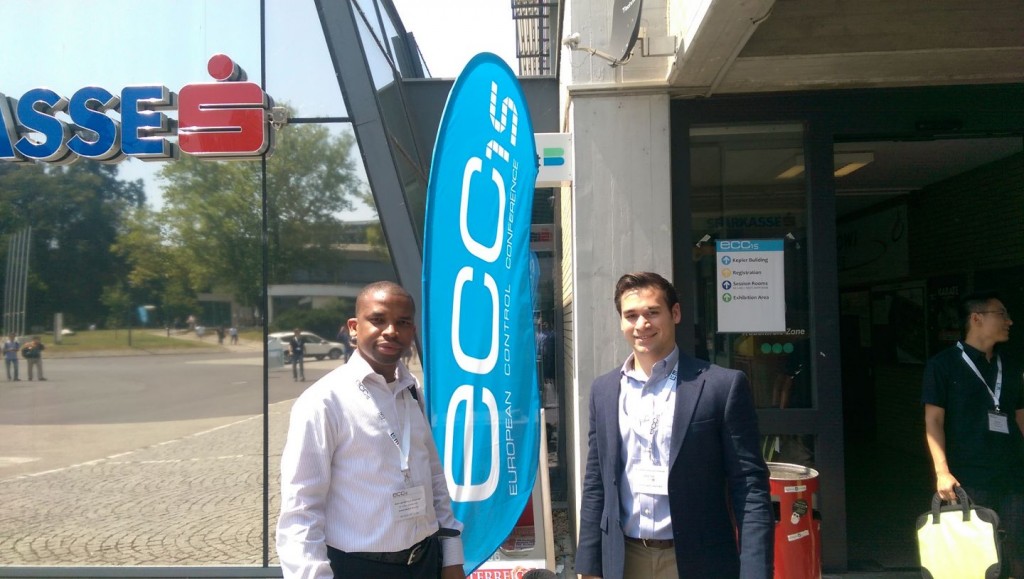He expected just eight weeks of intense research. He expected to immerse himself in learning and completing his project. Instead, senior Electrical Engineering major Eric Mauro’s Mentored Undergraduate Summer Experience (MUSE) impression lasted long past the summer of 2014.
Through collaboration and encouragement of his advisor, Associate Electrical and Computer Engineering Professor Dr. Ambrose Adegbege, Mauro wrote a paper, produced a poster and presented this summer at the 2015 European Control Conference in Linz, Austria.
“Research can be a lot more intensive if you want it to be,” Mauro said. “I was motivated to keep working on the research even on my own time, and a year later, I’m glad I did it.”
Mauro’s poster, titled, “Embedded Quadratic Programming for Low-end Low-cost Programmable Logic Controller”, is an extension of Adegbege’s research which focuses on control theory, especially constrained internal model control.

Adegbege chose to research control theory and quadratic programming because of its widespread applications, specifically in economics and engineering. Examples include option-stock pricing, dynamic programing, optimal control computations in control theory and more, Adegebege said.
“Many optimal control problems can be formulated as the problem of minimizing a quadratic objective function subject to constraints on system states, control efforts and system dynamics,” Adegebege said. “This has tremendous implications for real-time control.”
Autonomous flight control, auto-cruise control and solar tracking all include real-time control, according to Adegbege.
“I decided to participate in MUSE so that interested students can have opportunity to engage in cutting research while learning the rubrics,” Adegbege explained. “The overall objective is that students will learn from the experience and develop skills for independent inquiries and research.”
Each student participating in MUSE with Adegbege pursued specific research objectives within the realm of Adegbege’s research. Student collaboration, presentation and discussions were highly encouraged, as each student’s research could benefit a peer’s exploration.
“I chose to use a programmable logic controller because of its wide range of applications, especially in factory automation, and because it was something new to me,” Mauro said. “I wanted to challenge myself.”
Investigating low-cost programmable logic controllers is a relevant and useful tactic in many engineering applications, as the costs of computing power and memory are being reduced. Optimally arranging millions of “logic gate on a very small surface area” will reduce computing costs, according to Adegebege. “This is yet another example where quadratic programming has influenced circuit optimization and design,” Adegbege said.
Due to the less expensive computer power, however, more efficient algorithms with “less computation and storage requirements have to be developed,” Adegebe said. “This is the area the MUSE project on quadratic programing sought to address: the implementation of advanced algorithms on platform with limited storage and computational power.”
With an abundance of research, a working controller, and gathered data from hardware-in-the-loop simulations, Adegbege recommended Mauro to start searching for conferences to attend and potential paths to publications.
When Mauro and Adegbege’s research was accepted into the ECC, both travelled together to meet and interact with researchers and technical professions in areas of control theory and applications from around the world. At ECC, Mauro presented his poster independently, an important step in his research career.

“I was really overwhelmed when I first got to the conference. The presentations were so detailed and complex,” Mauro said. “It was a lot to take in, but I really gained an appreciation for all the research and for all the work that goes into it.”
Initially intimidated by being the only solo presenter, Mauro felt a great sense of accomplishment and achievement. Mauro received both “Outstanding Computational-Related Undergraduate Student Poster Award” and “Outstanding Undergraduate Student Poster Awards (First Prize).”
Adegbege recommends that all of his MUSE students search for publication and conference attendance opportunities. The MUSE program allows students to acquire and grow important skills for graduate schools or future careers, according to Adegbege.
“The engineering grand challenges for the twenty-first century are still unresolved,” Adegbege said. “I see my MUSE students moving on to take on these challenges in the future while fostering the discipline and the profession.”
The subjects to learn and the expansion of knowledge are endless – whether presenting in front of professionals in Austria or collecting data in Ewing, “there are still myriads of unanswered questions about our universe” according to Adegbege.
“I still have so much to learn, but I feel inspired to keep learning as much as possible,” Mauro said. “I feel so much more confident in myself… I am now better prepared for my future as an engineer.”
